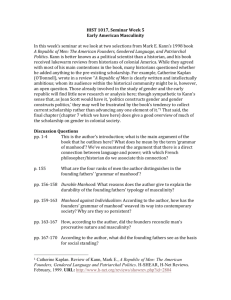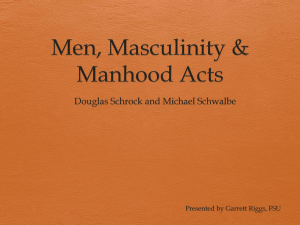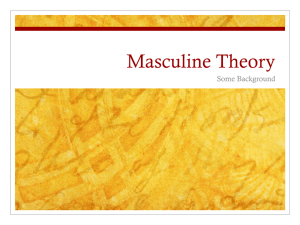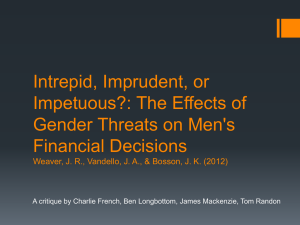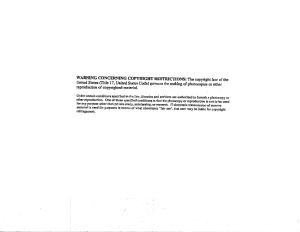File
advertisement
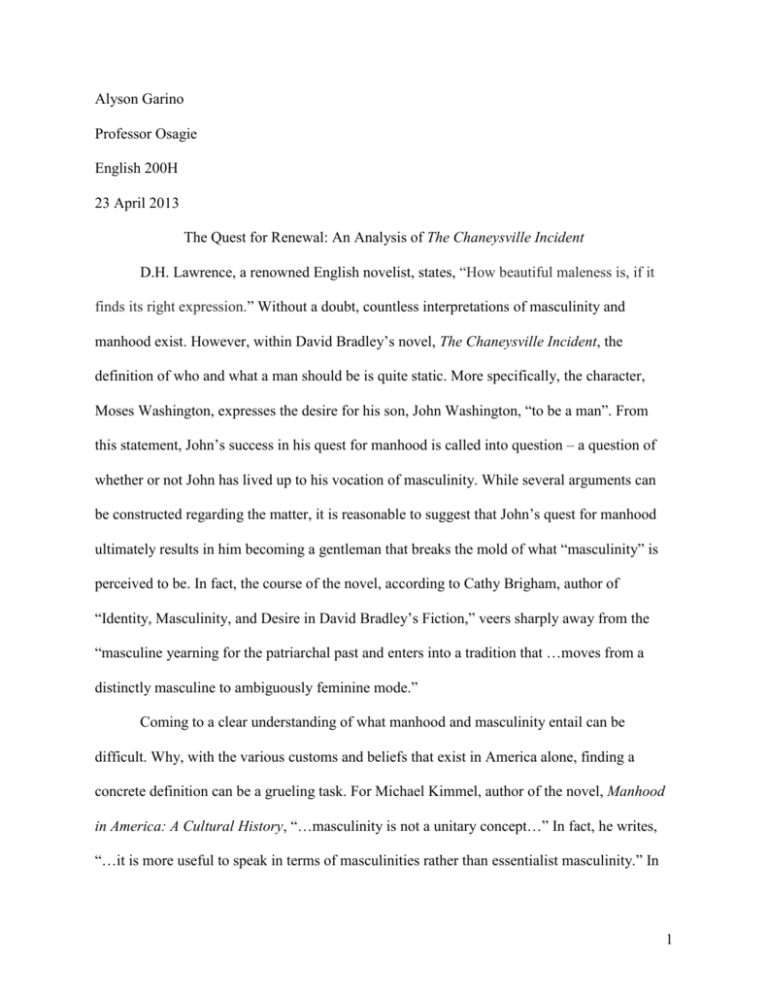
Alyson Garino Professor Osagie English 200H 23 April 2013 The Quest for Renewal: An Analysis of The Chaneysville Incident D.H. Lawrence, a renowned English novelist, states, “How beautiful maleness is, if it finds its right expression.” Without a doubt, countless interpretations of masculinity and manhood exist. However, within David Bradley’s novel, The Chaneysville Incident, the definition of who and what a man should be is quite static. More specifically, the character, Moses Washington, expresses the desire for his son, John Washington, “to be a man”. From this statement, John’s success in his quest for manhood is called into question – a question of whether or not John has lived up to his vocation of masculinity. While several arguments can be constructed regarding the matter, it is reasonable to suggest that John’s quest for manhood ultimately results in him becoming a gentleman that breaks the mold of what “masculinity” is perceived to be. In fact, the course of the novel, according to Cathy Brigham, author of “Identity, Masculinity, and Desire in David Bradley’s Fiction,” veers sharply away from the “masculine yearning for the patriarchal past and enters into a tradition that …moves from a distinctly masculine to ambiguously feminine mode.” Coming to a clear understanding of what manhood and masculinity entail can be difficult. Why, with the various customs and beliefs that exist in America alone, finding a concrete definition can be a grueling task. For Michael Kimmel, author of the novel, Manhood in America: A Cultural History, “…masculinity is not a unitary concept…” In fact, he writes, “…it is more useful to speak in terms of masculinities rather than essentialist masculinity.” In 1 the case of Bradley’s novel, such masculinities can be grouped around signifiers, such as race and sexuality. According to Old Jack Crawley, a noteworthy character within The Chaneysville Incident, “If [a man] don’t have no say over the things he needs to live, he ain’t got no say over whether he lives at all, an’ if he ain’t got no say over that, he ain’t no man. A man has to have say.” Along with Old Jack’s statement, Moses Washington, John’s father, is described as a man who “…liked to own people personally, not secondhand…He used his power, but not like a whip. More like a leash.” As suggested in the novel, without control, a man is, quite frankly, not a man. As readers, it is only natural to question where such ideals come from. Did Old Jack and Moses formulate these interpretations of manhood on their own, or are these interpretations part of a cycle that has become inheritable from generation to generation? Within the novel, Fathers, Preachers, Rebels, Men, edited by Timothy Buckner and Peter Caster, Jeff Forret, a featured writer, claims, “Bondage…directly challenged male slaves’ manhood…slave men successfully overcame the obstacles they faced to construct masculine identities. Their domination by masters certainly contributed to Southern white men’s sense of mastery, but enslaved men also actively created their own paradigms of masculinity.” As black men who must thrive in a white man’s world, Moses and Old Jack have unconsciously acquired the justifiable mentality of their ancestors who were oppressed by the cruelties of slavery. In other words, these two men have been conditioned by a horrible past – a past that leads them to advocate controlling, masculine behavior for proceeding generations to uphold. While the past has a great effect on how the male characters represent themselves and their notions of manhood within the novel, the status of women also serves as a major contribution. Zora Neale Hurston, in her essay, “Characteristics of Negro Expression,” claims 2 that women “merely go with nature rather than against it.” In accordance with this principle, Mary Wollstonecraft, in her work, “A Vindication of the Rights of Woman,” writes, “Women are told from their infancy, and taught by the example of their mothers, that a little knowledge of human weakness, justly termed cunning, softness of temper, outward obedience, and a scrupulous attention to a puerile kind of propriety will obtain for them the protection of a man…” Perhaps, in the same manner that masculinity operates, womanhood, if you will, is an acquired entity that is passed along the generations. If so, it seems that manhood and womanhood exist cohesively in the sense that men are raised to control while women are raised to be submissive. To go along with this argument, Monique Wittig, author of, “One is Not Born a Woman,” suggests, “One is not born, but becomes a woman. No biological, psychological, or economic fate determines the figure that the human female presents in society: it is civilization as a whole that produces this creature…” Humans, both men and women, have created their own reality. Moreover, an unremitting cycle of human behavior is formed. As suggested, John Washington, influenced by Moses and Old Jack, has merely become part of another generation imbedded with the domineering tendencies of manhood. In a sense, Moses and Old Jack serve as the models and creators of masculinity and, of course, it would make sense for John to follow their footsteps. As seen throughout the course of the novel, John exhibits his inherited masculinity. While interacting with his partner, Judith, his controlling nature is revealed. During one of their conversations, John blatantly says to Judith, “I don’t care what you think” and “Let me be”. Essentially, he places himself above Judith and speaks to her in a directive, commanding manner. Additionally, the way in which John engages with his mother gives insight to how he exercises the behaviors that merely seem natural to him. At one moment in the novel, John remembers the first time his mother gave him coffee and says, “She 3 meant it as an entry into her world, and it might have worked had it not been for the fact that, long before, Old Jack had initiated me into manhood with a sip of a far more potent brew.” Clearly, Old Jack has already conditioned John into being a man through introducing him to a stronger cup of coffee, which leads him to view his mother’s coffee as weak. Thus far, it has been suggested that Moses and Old Jack, who were, in turn, molded by their ancestors, have molded John into what it means to be a “man”. At the same time, women are directed into their place in society -- a place of submissiveness, which complements the controlling nature of the male. In a sense, a cycle, developed in the past, still dictates the present behavior of the characters within Bradley’s novel. Interestingly enough, the major premise of this novel focuses on John’s quest to uncover his family’s past. And, with John Washington being a practicing historian, the past seems to have a greater impact upon him and his beliefs. As written in Hayden Whites’ essay, “The Historical Text as Literary Artifact,” “…if the historian is himself a practitioner of [history], he is likely to be a devotee of one or another of its sects and hence biased…” To pursue this supposition further, it can be suggested that John, being so engrossed in his family’s history, traditions, and struggle, is seen to model his subjects of study, particularly his father, Moses. The important point to this suggestion is that most historical sequences can be emplotted in a number of different ways, which brings opportunities for different interpretations and meanings of those events. In order for John to let go of his father’s historical view of manhood, he must not view history as fact or doctrine, but rather, as White claims, “…a complex of symbols...” When John eventually adopts a new way of analyzing his family’s history, a dramatic change with his masculinity occurs. According to Brigham, “In the process of merging the structurally and thematically phallocentric story that has assembled as a file of color-coded index cards with Judith’s 4 imaginative oral reconstruction of history, John has reinvented his history and his identity.” In reference to John’s renewal of his identity (masculinity), it becomes apparent that he is a more open-minded individual who does not crave power and control over the women in his life. Toward the end of his quest to uncover the truth about his family’s history, John is compelled to visit his mother’s house. When he does so, he comes to the realization that “for a dozen years [his mother] had lived with a man who was so crazy that one day he was going to walk twentytwo miles just to find a nice spot in which to blow his brains out, and so preoccupied as not only to do it, but not to care enough about the effect of it on his wife – an his children – to try and make it look like an accident: a man who showed no mercy.” John becomes sensitized and, in a way, understanding of how his father was brutal and unfair to a woman who deserves compassion and respect. John has removed himself from his family’s corrupt past and adopted a new way of thinking -- perhaps a better way of thinking. As insinuated, John has embraced Old Jack and Moses’ views of masculinity, just as the two men have from their ancestors who suffered during the difficult times of slavery. In fact, Judith makes this quite clear when she says to John, “…you think that what somebody did or didn’t do to a bunch of people who died fifty years before you were born is something you ought to take personally…” Once John opens his heart and mind to a new way of looking at his family’s past, he is, what one can argue, free. In support of this argument, Roland Barthes, in his essay, “The Death of the Author,” writes, “Having buried the Author, the modern scriptor can thus no longer believe…the pathetic view of his predecessors.” In the case of The Chaneysville Incident, if a reader chooses to view Moses and Old Jack as “Authors”, meaning that they having created a standard of masculinity for John, as the “modern scriptor”, to follow, Barthes statement becomes quite clear and relevant. In his essay, Barthes makes the overall 5 claim that, with the “death”, or disregard of the author or creator of a certain principle, one can free themselves from the constraints that the creator impresses on the individual. When it comes to John Washington, he chooses to disregard the authors in his life (Moses and Old Jack) thus enabling him to develop his own way of thinking. Also, in an attempt to avoid jocularity, Moses and Old Jack literally had to pass away in order for John to liberate and transform himself. It can be argued that if one or both of these men continued to be part of John’s life, renewal would not have been possible. With all aspects considered, it is reasonably justifiable to insinuate that John experiences some sort of metamorphosis throughout the course of Bradley’s novel. When first introduced to him as a character, the reader is set with the impression that he is a controlling male who shows little to no respect toward the women in his life. Also, he is very close-minded and seemingly angered by many different aspects of his day-to-day life. With the help of Judith and her suggestion for him to look deep inside himself and break the mold that has been established by Moses and Old Jack, John is able to redefine what it means to be a man. To pursue this idea further, John progresses from Old Jack and Moses’ sense of manhood to his own self-created construction of maleness. Unlike his elders, John takes into account both his cultural heritage and what it means to appropriately survive in a modern era where men and women must coexist in harmony rather than opposition and submission. In essence, John comes to a new understanding of his family’s history. While doing so, he also comes to a new understanding of who he was and who he should be in a world that he must continue to create for himself. 6 References Barthes, Roland. “The Death of the Author.” Norton Anthology of Theory and Criticism. Print. Bradley, David. The Chaneysville Incident. New York: Harper & Row Publishers, 1981. Print. Brigham, Cathy. "Identity, Masculinity, and Desire in David Bradley’s Fiction." Contemporary Literature. 36.2 (1995): Web. 19 Apr. 2013. Buckner, Timothy, and Peter Caster. Fathers, Preachers, Rebels, Men: Black Masculinity in U.S. History and Literature 1820-1945. Columbus: The Ohio State University Press, 2011. 23-40. Print. Hurston, Zora Neal. "Characteristics of Negro Expression." Norton Anthology of Theory and Criticism. Print. Kimmel, Michael. Manhood in America: A Cultural History. Oxford University Press, 2011. Print. White, Hayden. “The Historical Text as Literary Artifact.” Norton Anthology of Theory and Criticism. Print. Wittig, Monique. “One is Not Born a Woman.” Norton Anthology of Theory and Criticism. Print. Wollstonecraft, Mary. “A Vindication of the Rights of Woman.” Norton Anthology of Theory and Criticism. Print. 7
